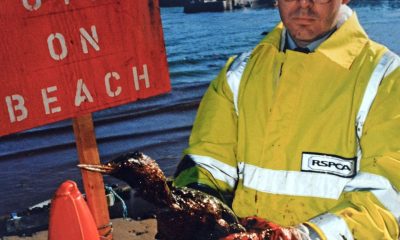News
Legal action threatened over ‘councillor’s’ status

THE COUNCIL’S Legal Department has failed to respond to two pre-action letters sent by solicitors acting on behalf of the local authority’s Labour Group as thedilemma over the future of David Boswell’s membership of the Council has taken yet another turn.
The Herald understands that the Council’s Legal Department now fears that if the Pembroke St Mary North ward was declared vacant, Mr Boswell might have a legal action against the local authority.
That potenital threat is two-fold: firstly, in relation to any change of position on the advice from Monitoring Officer Claire Jones he has relied upon; and, secondly, in respect of the potential prejudice formally removing him might cause to his scheduled trial at Swansea Crown Court.
Had Mr Boswell’s trial taken place as scheduled neither of the above issues could possibly have arisen.
Suspicion is growing among some council members that Council officers were counting on the trial being over to avoid embarrassment over the advice given to Mr Boswell by the officer upon whose advice they are entitled to rely upon as the last word.
However, the legal pressure has grown upon the authority. A letter before potential proceedings has been sent by a firm of solicitors acting for the Association of Labour Councillors.
With their initial letter unanswered, a second letter has now been sent from those solicitors which takes the Council to task both for their failure to respond to a letter marked ‘URGENT’, but also for statements made by the Monitoring Officer to the press and alleged comments made to councillors.
The Herald can confirm that despite receiving both letters, the Council has failed even to acknowledge their receipt at the time we went to press.
To quote the ALC Solicitor letter to the council: “We strongly disagree with your interpretation of this legislation and urge you to declare the vacancy as soon as possible. We do not consider that it is accurate or reasonable to describe a members’ seminar as a meeting of the local authority.”
The Council’s position turns on whether or not seminars for members are council meetings.
If they were Council meetings, the Council’s Legal Department would have been able to provide minutes of those meetings.
Council meetings, at law, are subject to rules in relation to publishing the agenda, setting out the the timetable, clear rules in regards to voting, and minute taking.
None of those apply to a seminar.
And the Council’s Legal Department refused to provide any of the information that define a Council meeting to this newspaper, claiming that it wanted to explain the legal situation to members first.
What that has to do with providing information that – if it exists – would prove the Monitoring Officer’s contention that seminars are meetings is unclear.
The Solicitors’ letter sent to the authority, sets out that position with a stinging rebuke to the Legal Department’s stated position, saying: ‘If it does not sound like a council meeting and it does not act like a council meeting, then it is more than likely not a council meeting’.
And ‘more likely than not’ is the key legal test. Not beyond a reasonable doubt, as in criminal proceedings.
Of course, the Council’s position would be stronger if it did not publish information likely to be of assistance to other potential parties to litigation.
At a meeting in 2011, a key Council committee considered a range of governance issues including member attendance at meetings.
The committee endorsed the position that members’ attendance should be published.
It even set out what meetings would be covered.
‘That the recording period cover each municipal year, and the record apply to attendances at formal Council body meetings (Council; Cabinet; Committees and Sub-Committees)’.
More fundamentally, it ‘suggested that training events/seminars be included in the attendance record’.
The distinction between what the Council then resolved were meetings on the one hand and members’ seminars and training on the other is crystal clear. If seminars were ‘meetings’ under the law, attendance would be recorded as a matter of course.
That is not the whole list of what is in the law covering council meetings. That also includes meetings which councillors attend as representatives of the authority.
However a list of what constitutes a council meeting cannot just be added to as and when a local authority finds convenient. A strong legal position would be that just because a statutory list of ‘meetings’ is not comprehensive (which is a fair reflection of the legal department’s position on the Local Government Act) that does not mean meetings which do not meet the criteria for council meetings can then be called council meetings.
The ridiculousness of the situation is best illustrated by the fact that on Wednesday (Feb 28), Mr Boswell attended a members’ seminar of an authority of which he is quite possibly no longer a member, while no press or public were admitted to the ‘council meeting’, no minutes were kept, and no agenda was published.
Why the Council’s legal department has been so reticent about replying to an urgent solicitors’ letter is a mystery, although no suggestion is made that it is either because council officers are hoping to ‘run down the clock’ in order to forestall taking any action at all or because they are paralysed by indecision.
In an email sent to all county councillors marked ‘CONFIDENTIAL’ in large red letters the Monitoriing Officer forcefully reminds members not to say anything that might jeopardise Mr Boswell’s trial. The Council’s monitoring officer appears also to suggest the Council has advice from ‘Leading Counsel’ (usually a QC) to support its position.
Advice from a barrister, even a leading one, is usually dependent on the content and quality of the instructions sent to one. There is a world of difference between a barrister being asked to advise a client and a barrister being asked to advise how a client might wriggle off a hook of their own making.
There is also a faint suggestion that legal advice obtained by the Council for the benefit of the authority might not be shared with all members. The way in which the email is set out makes it difficult to determine whether the Monitoring Officer would propose releasing advice on a limited basis. In addition, when quoting the Code of Conduct, Ms Jones states that members of a political party should consider whether or not they should declare ‘either a personal or prejudicial interest when speaking and voting’ on business of the authority.
That section of the email appears to be a remarkable attempt to prevent any debate by councillors of the cleft stick the council’s own officers have placed the authority in.
With dire warnings about ‘predetermination’ and ‘recent media stories’, Claire Jones seems to confuse discussing the potential that she might have got it wrong with expressing a view on whether or not Mr Boswell is guilty of the allegations – and that is all that they are – he faces.
The latter, it goes without saying is – quite properly strictly forbidden – the former is not the same thing at all.
Ms Jones’ email warns councillors of the dangers of expressing views as to whether or not she is wrong before an occasion upon which elected members can express a view. However, Ms Jones will know that pre-sentiment is not pre-determination, that councillors are permitted to make their minds up for themselves, and that the purpose of the rules about pre-determination and potential bias, as made clear by guidance given by the Public Services Ombudsman, is not to stifle either political or public discussion of contentious issues.
In addition, seeking advice on whether the Monitoring Officer is herself right or wrong is not predetermination by any means.
Climate
Communities offered share of £1bn energy fund — but questions remain over delivery

COMMUNITIES across Wales are being promised a stake in what ministers describe as the largest public investment in locally owned energy projects in British history, with up to £1 billion earmarked for solar panels, battery storage and small-scale renewable schemes.
The funding, announced this week by Great British Energy and the UK Government, forms part of a new “Local Power Plan” aimed at helping councils, schools, clubs and community groups generate and sell their own electricity.
Ministers say the approach will cut bills, create income streams and keep profits local rather than flowing to major energy companies.

However, while the headline figure is eye-catching, details about how much money will reach Wales — and how quickly — remain limited.
Welsh projects already backed
The government says nearly £9.5 million has already been allocated to projects in Wales over the past year, delivered with the Welsh Government.
Examples include rooftop solar on schools in Wrexham and Newport, and a new installation at Big Pit National Coal Museum in Pontypool, which is estimated to save more than £280,000 in energy costs over its lifetime.
A further scheme at a highways depot in Neath is projected to save the local authority around £910,000.
Energy Secretary Ed Miliband said the plan would “transfer wealth and power back to communities”, while Wales Secretary Jo Stevens described it as a way for towns and villages to “take charge of their own energy supplies”.
Big ambition — but funding spread thin
Despite the rhetoric, the £1bn pot is UK-wide and expected to support more than 1,000 projects across England, Scotland, Wales and Northern Ireland.
If split evenly, that would average around £1m per scheme — though ministers say grants and loans will vary and some funding will be reserved for advice and capability building rather than construction.
Community energy groups have long argued that red tape, grid connections and upfront costs are bigger barriers than ambition.
There are also questions over whether smaller volunteer-led organisations will have the technical expertise to compete for funds against better-resourced councils and developers.
Industry bodies broadly welcomed the move but stopped short of calling it transformational without clearer timelines.
What it could mean locally
If delivered effectively, the model could allow:
• village halls and sports clubs to reduce running costs
• schools to generate income from spare electricity
• councils to cut energy bills on public buildings
• residents to buy shares in local renewables
Supporters say that keeps money circulating in the local economy rather than leaving the area.
The announcement follows other energy developments affecting Wales, including backing for offshore wind in the Celtic Sea such as the Erebus Floating Offshore Wind Farm off Pembrokeshire.
Waiting for the detail
For now, communities are being invited to register interest via Great British Energy, with grant schemes expected to launch later this year.
Whether the plan proves to be a genuine shift in ownership or simply another competitive funding round will depend on how accessible the money is — and how much of it ultimately reaches places like Pembrokeshire rather than being absorbed at national level.
Local groups considering bids will be watching closely.
Charity
Donation gives Stackpole Quay book trailer fresh new look

A COMMUNITY donation will help spruce up a popular summer book trailer at Stackpole Quay after members of the Pembrokeshire National Trust Association handed over more than one thousand pounds to support the project.
The Pembrokeshire National Trust Association presented a cheque for £1,095 to the National Trust at Stackpole Quay this weekend.
The cheque was formally given to Rhian Sula, General Manager for the charity’s Pembrokeshire and Carmarthen Bay portfolio, by association chairman Jane Mason during a National Trust information coffee morning at the Stackpole Centre.
The money will be used to refurbish the well-known second-hand book trailer which operates at the quay during the summer months. The trailer allows visitors to pick up a holiday read while making a donation, with proceeds supporting local conservation and access projects.
Last year alone, the trailer raised more than £1,500.
Jane Mason said the association had originally funded the purchase of the trailer several years ago and wanted to build on its success.
“Our new donation from members’ support will improve the trailer with updated imagery and design,” she said. “This will help the National Trust present a more professional, welcoming and brand-aligned offer, and potentially grow donation income.”
The Pembrokeshire National Trust Association runs a programme of talks, visits and guided walks in support of local Trust properties. Membership of the National Trust is not required to join the association. Annual membership costs £5 for individuals and £8 for couples.
At its AGM in November, the group announced £3,000 in additional donations for local projects, including replacement willow hurdles at Tudor Merchants House, footpath improvements at Little Milford, and a new bench, tree planting and path works at Southwood.
With the latest contribution towards the book trailer, the association’s donations for the current financial year now exceed £4,000.
Photo caption:
Jane Mason presents a cheque for £1,095 to Rhian Sula at Stackpole Centre (Pic: supplied).
Crime
OAP admits stalking woman with emails, posters and letters

A HAVERFORDWEST man has admitted stalking a woman by sending repeated unwanted emails, putting up posters and contacting third parties about her.
Michael Lockheart, aged 80, of Daisy Lane, appeared before Haverfordwest Magistrates’ Court on Monday (Feb 9) for sentencing, having previously pleaded guilty to stalking.
The court heard that between July 27 and September 10 last year, Lockheart pursued a course of conduct which amounted to the stalking and harassment against a female.
His behaviour included sending numerous unwanted emails after being told to stop contact, distributing defamatory posters in public places, and sending malicious correspondence to her GP and the local authority.
Lockheart admitted the offence, contrary to Section 2A of the Protection from Harassment Act 1997.
Sentencing was adjourned to allow a pre-sentence report to be prepared.
He was granted conditional bail with strict restrictions. He must not contact the complainant directly or indirectly, including through third parties or social media, and must not enter any address where she lives.
Lockheart is due back before magistrates for sentence at 10:00am on Monday, March 9.
-

 Health5 days ago
Health5 days agoHealth board targets rise in steroid and gym drug use across west Wales
-

 Crime6 days ago
Crime6 days agoSex offender jailed after living off grid in Pembrokeshire and refusing to register
-

 Crime5 days ago
Crime5 days agoTeacher injured and teenager arrested for attempted murder at Milford Haven School
-

 Crime7 days ago
Crime7 days agoHakin man’s appeal delayed again as Crown Court seeks guidance on insurance law
-

 Business23 hours ago
Business23 hours agoComputer Solutions Wales under fire from customers
-

 Business4 days ago
Business4 days agoSix-figure negligence victory leaves retired builder trapped in divorce limbo
-

 Crime6 days ago
Crime6 days agoJohnston man remanded in custody over knife and assault charges
-

 Crime7 days ago
Crime7 days agoMan spared jail after admitting child abuse image offences







































